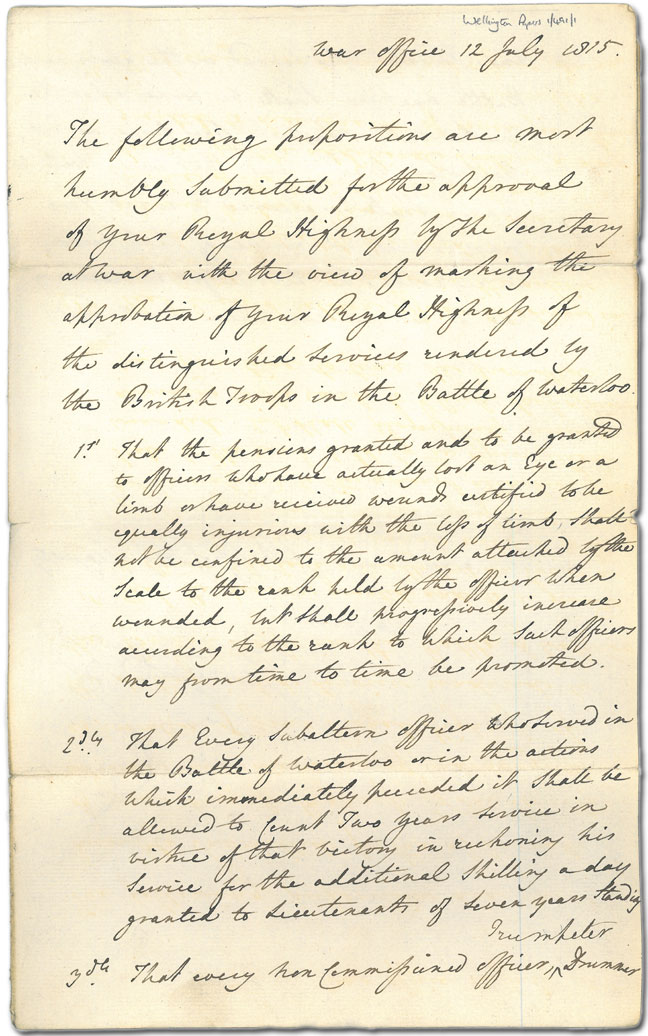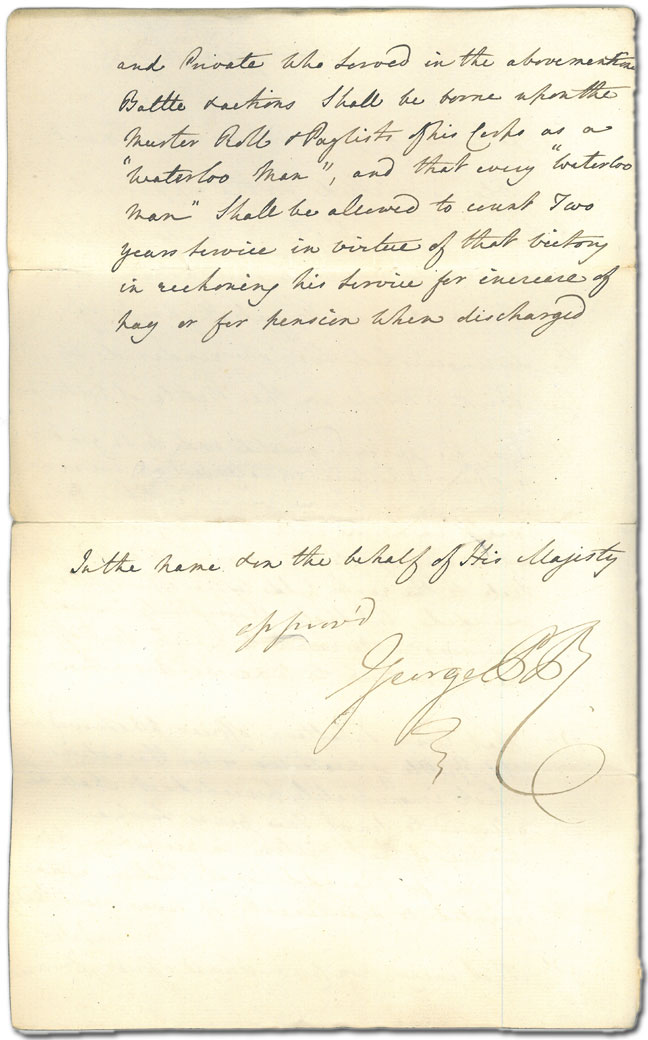Battle of Waterloo: Recognising the Service of Individuals

Share this step
Commanding officers were responsible for reporting on and making recommendations about the conduct of their men. The general commanding usually issued a general order: Wellington took the opportunity on 20 June
‘of returning to the army his thanks for their conduct in the glorious action fought on the 18th instant, and he will not fail to report his sense of their conduct in the terms which it deserves to their several sovereigns’.
Other congratulations were not long in arriving. The Prince Regent conveyed his thanks to Wellington on 22 June in immediate response to the arrival of the Waterloo Despatch in London:
I lose not a moment in communicating to you the fulness of my joy and admiration at the unparalleled triumph of your last and greatest achievement. Greatest, my dear Lord, not only in military glory, but in political importance; and not only in this proof of what all believed, that even the consummate skill of the Corsican could not withstand the superior genius of our own hero, but in the now nearly realised expectation, resulting from this victory, that England, under the auspices of her transcendent general, is again destined to rescue the world from tyranny and oppression.Receive the fullest tribute of my gratitude, as the representative of the sovereign of this favoured land, whose happiness has no alloy but in the grief we must feel for the loss of the brave who have fallen.I have now, my dearest Lord, only to add my thanks to the Almighty for having, in His mercy, preserved your life in this most dreadful and sanguinary conflict; and my prayers for His constant protection of your person, and His fullest blessings in the glorious exertions which may yet remain for you to make in the final deliverance of Europe.
One of the most common forms of recognition among the officer corps was promotion. The primary unit in the British and Hanoverian forces was the regiment. Each officer was appointed by a commission to a rank in the regiment — in ascending order, in foot regiments, ensign, lieutenant, captain, major, lieutenant colonel; and similarly in cavalry regiments, but with the rank of cornet replacing that of ensign. The most senior officer of the regiment was the colonel, who was usually a general officer — that is, with the rank of major general, lieutenant general, general or field marshal. At the same time as well as holding a rank in the regiment, officers held a rank in the army. Promotion within the regiment required a vacancy — which might not be available — but it was possible for officers to be granted a more senior rank in the army. This was the purpose of ‘brevet promotion’, and officers described as, for example, ‘brevet major’, had been promoted in this way and held this rank in the army.
The King acquiesces in Lord Castlereagh’s proposal that Lieutenant General Sir Arthur Wellesey should succeed to the command of the troops in Portugal. In agreeing however to so young a lieutenant general holding so distinguished a command, while his seniors remain unemployed, His Majesty must desire that Lord Castlereagh will keep in view that if the corps in Portugal should be further increased hereafter, the claims of senior officers cannot with justice be set aside.
It was to this end that Lieutenant General von Alten wrote to Wellington on 20 June, supplementing his report of the preceding day, with a series of recommendations for the promotion of officers [see Document 1].
Other benefits granted after Waterloo
In addition to promotion and to changes in seniority, in the case of Waterloo specific benefits were granted to some officers and to all other ranks who took part in the battle. The Prince Regent approved on 12 July propositions made by Lord Palmerston (the Secretary at War, in charge of the administrative business of the War Office, a different post from that of Secretary of State for War) [see Document 2]. These gave additional rights to officers who had been wounded; and advanced lieutenants who had taken part in the battle or the preceding actions two years’ service towards the increment of pay they were due after seven years. All other ranks who had served at Waterloo and the actions immediately preceding were to be known as ‘Waterloo men’, and were also allowed two years’ additional service in the reckoning of pay or pension.
Medals
Medals had been issued to officers of the British army for service during the Peninsular War, but no general medal was issued for service in that war until 1847–8. Waterloo was different and the intention of the British government was to issue a general medal to all the ‘Waterloo men’ of the British army and the King’s German Legion, a distribution that took place in 1816–17. There was some confusion, however, and the lists used by the Royal Mint for the distribution referred to all the officers and men who were in the Low Countries at the time of the battle. Wellington noted, in response to a claim for a medal made by a Captain Mitchell in 1820, that ‘Whole corps therefore which were never in the battle received and now wear the medals …’
Knighthoods and military orders
Officers might receive a further mark of distinction in the award of a knighthood in a military order. The Order of the Bath was expanded from and re-organised in January 1815 into civil and military divisions. There were henceforth to be 72 Knights Grand Cross, 180 Knights Commander, and an unspecified number Companions of the Bath — some 500 were ‘gazetted’ (that is, appeared in a list in the London Gazette) in September 1815. Some of the senior British officers at Waterloo were also awarded foreign orders of knighthood.
Document 1: Letter from Lieutenant General Carl von Alten to Field Marshal the Duke of Wellington, Brussels, 20th June, 1815
My Lord Duke,
In consideration of the very severe loss the 3rd Division sustained in the battle of the 18th instant, and the very favourable report on the conduct of every regiment composing it during that trying day, which I considered it my duty to submit to Your Grace yesterday, I take the liberty to ask whether Your Grace will be pleased to attend to the recommendation of the senior officer of each regiment of the British and Legion brigade under the rank of lieutenant colonel for a step of brevet rank, which I should be most happy to submit to Your Grace. In the meantime I trust Your Grace will permit me to recommend the following officers for such promotion:
Major Hans Bussche, of the 1st light battalion King’s German Legion, an officer of long tried and distinguished merit, who remained with the battalion of detachments in the Peninsula in 1809, and until the return of the British army from France last year, and was present in most of the Peninsula actions: he lost his arm in the battle of the 18th, and I particularly wish this distinction for him, as his constitution, which is much broke on service, will if even he recovers, hereafter render him unfit to continue serving.
Major Baring, 2nd light battalion King’s German Legion, for his distinguished conduct on the 18th instant in conmand of the regiment, as noticed in my report of yesterday.
Brevet Major Heise, of the 2nd light battalion King’s German Legion, who was with me during the whole of the action of the 18th, and of much assistance, whom His Royal Highness the Prince of Orange has been pleased to assure that he intended recommending him to Your Grace for the brevet for the action; who has been for several years Assistant Adjutant General to the 2nd Division in the Peninsula, and has, since my holding the command of the Hanoverians, been very useful to me as Military Secretary to that corps.
Captain Andrew Clewes, of the Royal German Artillery, who commanded a brigade of artillery with great distinction in the battle of Albuera, in several other actions in the Peninsula, and on the 16th and 18th instant.
Captain Shaw of the 43rd regiment, Deputy Assistant Quartermaster General, whose services previous to and during the action were most important to me, and is an officer who should be brought forward in order to be placed in situations where his military talents can be best employed.
The above recommendations, which I have taken the liberty to make, I have confined to officers who were present in both the actions of the 16th and 18th, and what fell under my immediate notice. I have written to Major General Sir Colin Halkett to know whether he has any officers of his brigade he wishes particularly to recommend.
Should Your Grace be inclined to attend, either immediately or at some future opportunity, to recommendations of distinguished officers who were wounded on the 16th instant, I beg to draw Your Grace’s notice to Major Parkinson of the 33rd regiment; Brevet Major Jessop of the 44th regiment, Assistant Quartermaster General of the 3rd Division, a very useful staff officer; and my aide de camp, Lieutenant Havelock of the 43rd regiment.
[SD, x, pp. 543–4]
Document 2: Memorandum by Lord Palmerston, Secretary at War, for the Prince Regent, War Office, 12 July 1815. The Prince Regent has signed the document at the end to mark his formal approval.


The following propositions are most humbly submitted for the approval of Your Royal Highness by the Secretary at War with the view of marking the approbation of Your Royal Highness of the distinguished services rendered by the British troops in the Battle of Waterloo.
First, that the pensions granted and to be granted to officers who have actually lost an eye or a limb or have received wounds certified to be equally injurious with the loss of limb, shall not be confined to the amount attached by the scale to the rank held by the officer when wounded, but shall progressively increase according to the rank to which such officers may from time to time be promoted.
Secondly, that every subaltern officer who served in the Battle of Waterloo or in the actions which immediately preceded it shall be allowed to count two years service in virtue of that victory in reckoning his service for the additional shilling a day granted to lieutenants of seven years standing.
Thirdly, that every non-commissioned officer, trumpeter, drummer and private who served in the abovementioned battle and actions shall be borne upon the muster roll and paylists of his corps as a ‘Waterloo man’, and that every ‘Waterloo man’ shall be allowed to count two years service in virtue of that victory in reckoning his service for increase of pay or for pension when discharged.
In the name and in the behalf of His Majesty, approved George, Prince Regent.
[University of Southampton Library, MS 61, Wellington Papers 1/491/1. Crown copyright: reproduced by courtesy of the Controller of Her Majesty’s Stationery Office.]
Share this

Reach your personal and professional goals
Unlock access to hundreds of expert online courses and degrees from top universities and educators to gain accredited qualifications and professional CV-building certificates.
Join over 18 million learners to launch, switch or build upon your career, all at your own pace, across a wide range of topic areas.
Register to receive updates
-
Create an account to receive our newsletter, course recommendations and promotions.
Register for free








